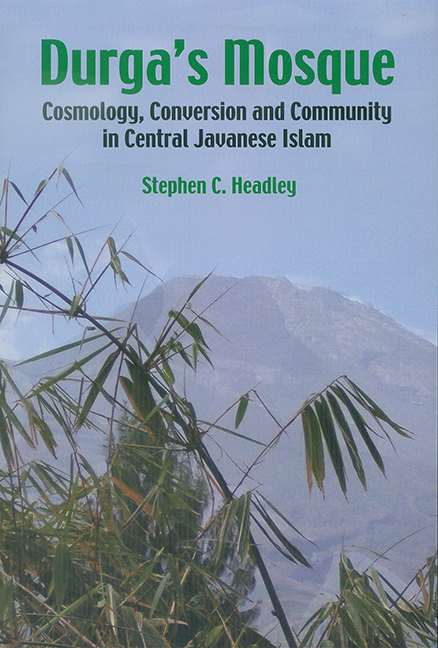Book contents
- Frontmatter
- Contents
- List of Figures
- List of Tables
- Preface
- Acknowledgements
- Introduction: Cosmology, Conversion and Community in Javanese Islam
- PART I THE SOCIOLOGY AND PRACTICE OF RELIGION IN CENTRAL JAVA
- PART II RECONSTRUCTION OF LOCAL RELIGIOUS HISTORY
- PART III INVOKING THE COSMOS, MAGNIFYING ALLAH: STRUCTURING A LANDSCAPE IN THE SEVENTEENTH TO NINETEENTH CENTURIES
- PART IV COSMOLOGY, CONVERSION AND COMMUNITY IN CENTRAL JAVANESE ISLAM TODAY
- 12 Jihad in Java: An Islamic Appropriation of Individualism
- 13 Of Sacred Wells and Shopping Malls: Glimpses of the Reconstruction of Social Confidence in Solo after Soeharto
- 14 The Social Reconstruction of Confidence: Community and Islam in Surakarta Today
- 15 Enclosing Cosmologies and Elective Citizenship
- Bibliography
- Index
- About the Author
15 - Enclosing Cosmologies and Elective Citizenship
from PART IV - COSMOLOGY, CONVERSION AND COMMUNITY IN CENTRAL JAVANESE ISLAM TODAY
Published online by Cambridge University Press: 21 October 2015
- Frontmatter
- Contents
- List of Figures
- List of Tables
- Preface
- Acknowledgements
- Introduction: Cosmology, Conversion and Community in Javanese Islam
- PART I THE SOCIOLOGY AND PRACTICE OF RELIGION IN CENTRAL JAVA
- PART II RECONSTRUCTION OF LOCAL RELIGIOUS HISTORY
- PART III INVOKING THE COSMOS, MAGNIFYING ALLAH: STRUCTURING A LANDSCAPE IN THE SEVENTEENTH TO NINETEENTH CENTURIES
- PART IV COSMOLOGY, CONVERSION AND COMMUNITY IN CENTRAL JAVANESE ISLAM TODAY
- 12 Jihad in Java: An Islamic Appropriation of Individualism
- 13 Of Sacred Wells and Shopping Malls: Glimpses of the Reconstruction of Social Confidence in Solo after Soeharto
- 14 The Social Reconstruction of Confidence: Community and Islam in Surakarta Today
- 15 Enclosing Cosmologies and Elective Citizenship
- Bibliography
- Index
- About the Author
Summary
In this conclusion, I would like to lift this documentary monographic contribution on the introduction of Islam to Central Java to the level of a theoretical one. Throughout the preceding chapters our perspective on Java has frequently been contrasted to those of Andrew Beatty and John Pemberton. But our unnamed opponent has been Emile Durkheim and an untenable opposition of individual and society (Ingold 1996, pp. 57–98). If in the Elementary Forms of Religious Life (1912) the society is present in the individual, his search for a positive definition of religion, discourages Durkheim from starting from God/Allah as totality and pushes him in the direction of a distinction between the sacred and the profane. Our disagreement with this dichotomy is that our description of Java has made it clear that a Javanese may not perceive division between the sacred and the profane, since the social space created by his relations with others projects him immediately as part of a whole. It is less a question of collective representation of types of ideas which individuals accept, than individual(istic) participation in a common cosmology. A person with no relation of any kind would have no existence in society. It is in this sense of society that brings a man to life. As often as possible we have described how Javanese persona are formed by these relationships into which they enter.
In former times there was no precise word for this formative matrix. The word in Javanese now used is masyarakat which originally meant group or association before being used to translate the imprecise concept of society. Now during the 1980s Javanese themselves say, for instance, of the dakwah (“propagating” the faith) campaigns, that Javanese society (masyarakat) was still being Islamized. It was not Western social sciences that brought about the possibility of distancing oneself from the object of observation (society) to better understand it. As Jonathan Spencer has pointed out “this distinction lay at the very heart of colonial practice … orderly government without active reform of local society” (in Ingold 1996, p. 79). Already Boeke in his 1930 inaugural address in Leyden University had described Java as a dual (native and colonial) society. Needless to say, the Javanese had realized that long before.
- Type
- Chapter
- Information
- Durga's MosqueCosmology, Conversion and Community in Central Javanese Islam, pp. 514 - 536Publisher: ISEAS–Yusof Ishak InstitutePrint publication year: 2004

